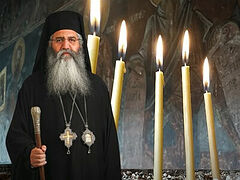See the previous articles, “Don’t Grab the Anchor!”, “Humility is a Nameless Grace,” and “A Humble Heart Sees No Enemies.”
In this fourth part of our series on humility from His Eminence Metropolitan Athanasios of Limassol of the Church of Cyprus, he continues his analysis of the teachings of St. John Climacus in The Ladder of Divine Ascent.
We stopped at the 26th word of St. John Climacus, “On discernment of thoughts, passions and virtues.” Thus, St. John speaks about those “in the flesh who are piously aiming at perfection,” and names their main characteristic features: “an unfettered heart, perfect love, a well of humility…” (26.19). We have analyzed the first two signs of perfect souls in previous meetings. Today we will focus our attention on the well of humility.
Perfect people have within themselves a well of humility, a well that streams forth a wealth of humble thoughts and feelings. Humility is a permanent state when Christ lives in the heart of a man. This is the state of the Divine presence in a man. Humility means thinking with humility, with humble thoughts and a humble heart.
So, one of the characteristics of the perfect man is a well of humility. The word “well” here makes a special impression on me, because the Lord Himself uses this word:
But whosoever drinketh of the water that I shall give him shall never thirst; but the water that I shall give him shall be in him a well of water springing up into everlasting life (Jn. 4:14).
It turns out that a well that will stream forth water is formed within a man. The grace of the Holy Spirit doesn’t give us just one feeling or thought, but becomes the source of a host of thoughts and various feelings. All this is like a spring that gushes forth cool, fresh, and healthy water; and you look at it, you rejoice, and you’re ecstatic that this oasis is to be found here, in such an arid place. In approximately the same way, the source of grace begins to beat in a man’s heart, already independently streaming forth a wealth of holy thoughts within the heart. As St. Joseph the Hesychast said:
“There are so many thoughts in my heart, that even though ten scribes should try to record all that I would like to say and express, they couldn’t manage.”
And, undoubtedly, for holy people they’re not just reflections or some philosophical speculations, but the experience of the Holy Spirit, because these holy thoughts are found not in the brain, but in the heart.
In his chapter on humility, St. John Climacus says that it is a treasure that is, in fact, the adornment of Christ. What is humility? Different wise men have given different interpretations. One said it’s forgetting your achievements. For example, having committed some good, pious work or something worthy of praise, you immediately forget about it, not saying: “Oh, look what I’ve done!”
 St. Ephraim of Katounakia I remember one day Elder Ephraim of Katounakia called me to come see him in Katounakia to tell me about something he had experienced, where he felt like he had come to the point of death and had stood before the Judgment of God.
St. Ephraim of Katounakia I remember one day Elder Ephraim of Katounakia called me to come see him in Katounakia to tell me about something he had experienced, where he felt like he had come to the point of death and had stood before the Judgment of God.
“Then I saw myself and realized that I had nothing to present to the Lord,” the Elder said.
I told him:
“Geronda, you left everything behind when you were just twenty, and spent more than sixty years in the desert. You spent your whole life in such purity; for forty-two years you were the novice of a rather harsh and merciless man; and you acquired such rich spiritual experience; you were granted such grace, so many Divine revelations, accompanied by the gifts of prophecy and clairvoyance, and now you have nothing to say?”
“My child, I looked at myself and realized that I had absolutely nothing—nothing!”
Such is the humility of the saints, who can find nothing to present to the Lord at the Judgment, because they have forgotten all of their achievements; they consider them worthless; they don’t think they’ve done anything special.
One day at Elder Paisios’ kallyva, during one of our talks, the Elder said:
“I fight with despair every day: Will I be saved or not? Maybe the Lord will in the end have mercy on me and I’ll be saved. And then there are all these people knocking on my door, venerating me as a saint.”
This is how the holy man thought. But now we compare ourselves with the saints; we talk about our achievements in Confession, and we wait for people to ask us about our lives and talk about how wonderful we are. There are even people who can be so impressed when talking about themselves that they start weeping from excessive emotion. Imagine, what nonsense! This is the edge of madness! From the spiritual point of view, imagining yourself as someone significant is madness before God.
Thus, St. John says that humility is considering yourself as the last and greatest sinner of all. There is no one worse than me. There is no greater sinner than me. These are the feelings the saints experience.
I’ve already told you about how Elder Sophrony answered a monk who said to him:
“Geronda, I feel like I’ve sunken to the very bottom.”
“Are you sure you’ve reached the bottom? Okay, are you standing firmly on it?”
“Yes.”
“No. You haven’t reached my head. I’m even lower than you think.”
Abba Isaac said quite beautifully: “He who has fallen quite low—how much further can he fall?”—for if you’re at the very bottom, can you really go any lower?
Another said that humility is “The mind’s recognition of one’s weakness and impotence” (25.3).
You have to realize your own powerlessness.
Another again: “In fits of rage it means to forestall one’s neighbour and be first to stop the quarrel” (25.3).
That is, be the first to move towards reconciliation and bring peace, rather than inflaming the quarrel even more.
And again another: “Recognition of divine grace and divine mercy.”
And again another: “The feeling of a contrite soul, and the renunciation of one’s own will” (25.3).
You have to feel broken and renounce your own will. Don’t insist on your own way. There are people who if you force them to cut off their own will, they’ll fall on their face and start convulsing. So much resistance in them! Sometimes I conduct an “exam” like this with a novice: I say: “Put the bottle down like this.” He puts it down his own way. I tell him: “Do it this way.” But still, he does it his way. Is it really so hard to do it the way you’re asked? It turns out, for him it’s very difficult, and even impossible sometimes.
 Mother Charithea, abbess of St. Heraclidius Monastery I remember how Mother Charithea, abbess of St. Heraclidius Monastery, told me how a rather headstrong and cunning sister came to her one day and asked:
Mother Charithea, abbess of St. Heraclidius Monastery I remember how Mother Charithea, abbess of St. Heraclidius Monastery, told me how a rather headstrong and cunning sister came to her one day and asked:
“Mother, how should I do this job?”
“Do it this way, Sister.”
“But I can’t do it that way, Mother. It’s hard.”
“Well, then do it this way.”
“It won’t work that way either.”
“Then try it this other way.”
“That won’t work either.”
“Then do it however you want.”
As soon as she heard, “Do it however you want,” she immediately said: “Bless.” Only then was she able to calm down. The abbess offered her three ways, but only the one she wanted suited her.
And further, St. John Climacus says:
But when I had listened to all this … having gathered what fell from the lips of those learned and blessed fathers … I too gave my definition of it and said: “Humility is a nameless grace in the soul, its name known only to those who have learned it by experience” (25.3).
Humility is grace, the energy of the Holy Spirit; it is nameless, because no matter what you call it, it will encompass all of it: grace, energy, wealth, treasure… Who can talk about humility? Those who have come to know it in their own experience, those who have tasted it—only they can define it. Also, “it is unspeakable wealth” (25.3). That is, inexpressible, indescribable. Only the saints, who allow it into their lives, can talk about it. It is “a name and gift from God, for the Lord says: Learn of Me; for I am meek and lowly in heart” (25.3). Humility is something incomprehensible, just as the Lord Himself is incomprehensible. After all, we can’t fully describe the Lord. Even if we bring forth a thousand epithets, they won’t be enough. Therefore, man, who is the image of God, is also unspeakable, indescribable. The humble man is incomprehensible in his greatness, because through humility, the Lord Himself is present with him, and he becomes like God, as He said: Learn of Me; for I am meek and lowly in heart (Mt. 11:29). Christ has taught us a lesson of humility, and whoever learns it will be saved.
Let’s analyze the signs of humility.
For as soon as the cluster of holy humility begins to blossom within us, we at once begin, though with an effort, to hate all human glory and praise (25.4).
Praise tires the humble man. He doesn’t seek human glory. He is ill at ease from praise; he feels uncomfortable. Conversely, a proud and egotistical man rejoices in glory. We all have this bad thirst for glory. When good things are said about us, we act like we don’t like it, but in fact we like it, and we wish the praise would never stop.
… and to banish from ourselves irritation and anger (25.4).
When we notice anger and irritation within ourselves, it means there’s egotism within us, and no humility. A malicious, angry, irritable, nervous man who loses his temper, whose teeth grind from a nervous disorder, hasn’t even a grain of humility. Such a man needs a spiritual doctor, and sometimes a physical one too. Humility can never settle in the midst of anger and malice. If you see anger and malice within yourself, you can immediately understand that you have egotism, pride, and a lack of humility.
Thus, having begun to live spiritually, a man comes to hate glory and praise and he’ll avoid anger, malice, fights, and so on. When he grows spiritually, then all the good that he does he considers as nothing, or even “an abomination.” For example, others will tell him: “Good job! What a good thing you did!” He’ll ask them: “What did I do that’s so good? I didn’t do anything, just an abomination.”




